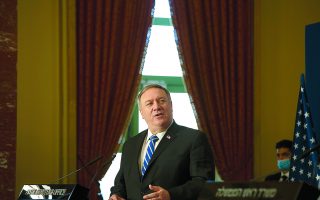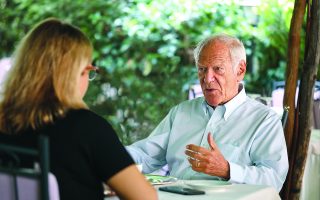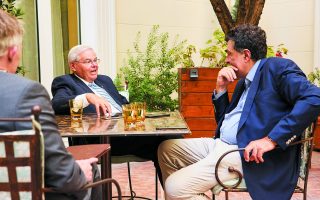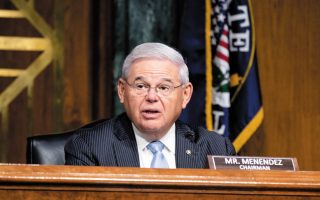Souda Bay ‘a key strategic asset for the US’
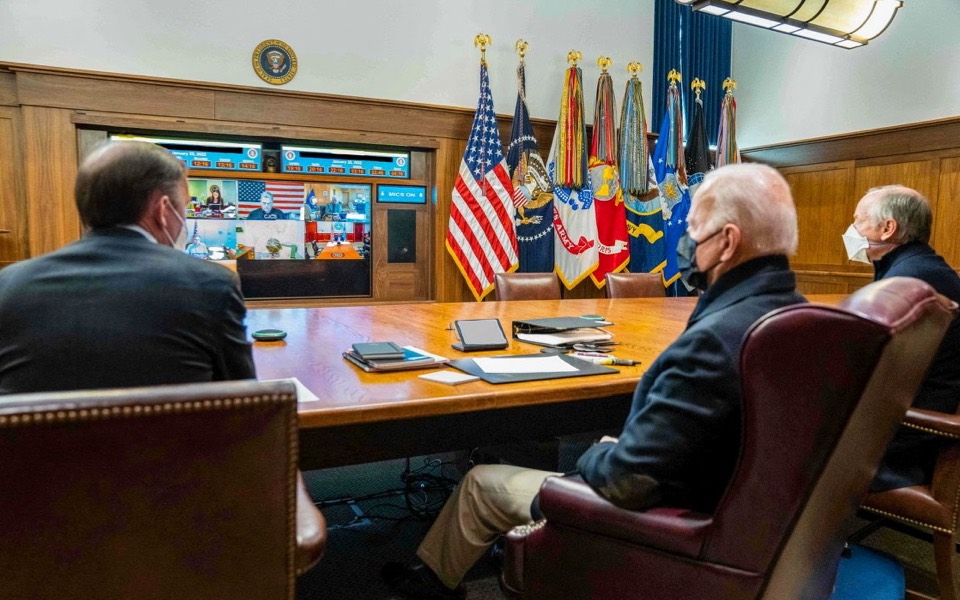
He arrived in Vienna just as the crisis with Russia was about to kick off. Ambassador Michael Carpenter, a close ally of US President Joe Biden, assumed office as the permanent representative of the US to the Organization for Security and Cooperation in Europe on November 29, 2021 and quickly had to immerse himself in complex diplomacy as Russia was starting to build up forces close to the border with Ukraine.
Indeed, Carpenter took part in one leg of the negotiations with Russia last week in Vienna, where the differences between Moscow and the West remained.
In this interview with Kathimerini he underlines that the United States wants to avoid confrontation and pursue diplomacy, but on the other hand he believes that the international order based on the sovereignty of nations and their free choices to take part in geopolitical alliances should be defended.
Carpenter warns that in case of invasion, the broadening of sanctions will be guaranteed as “nothing is off the table.” As regards Greece, he says that Athens’ contribution to the common effort to contain Russia is expected to be considerable.
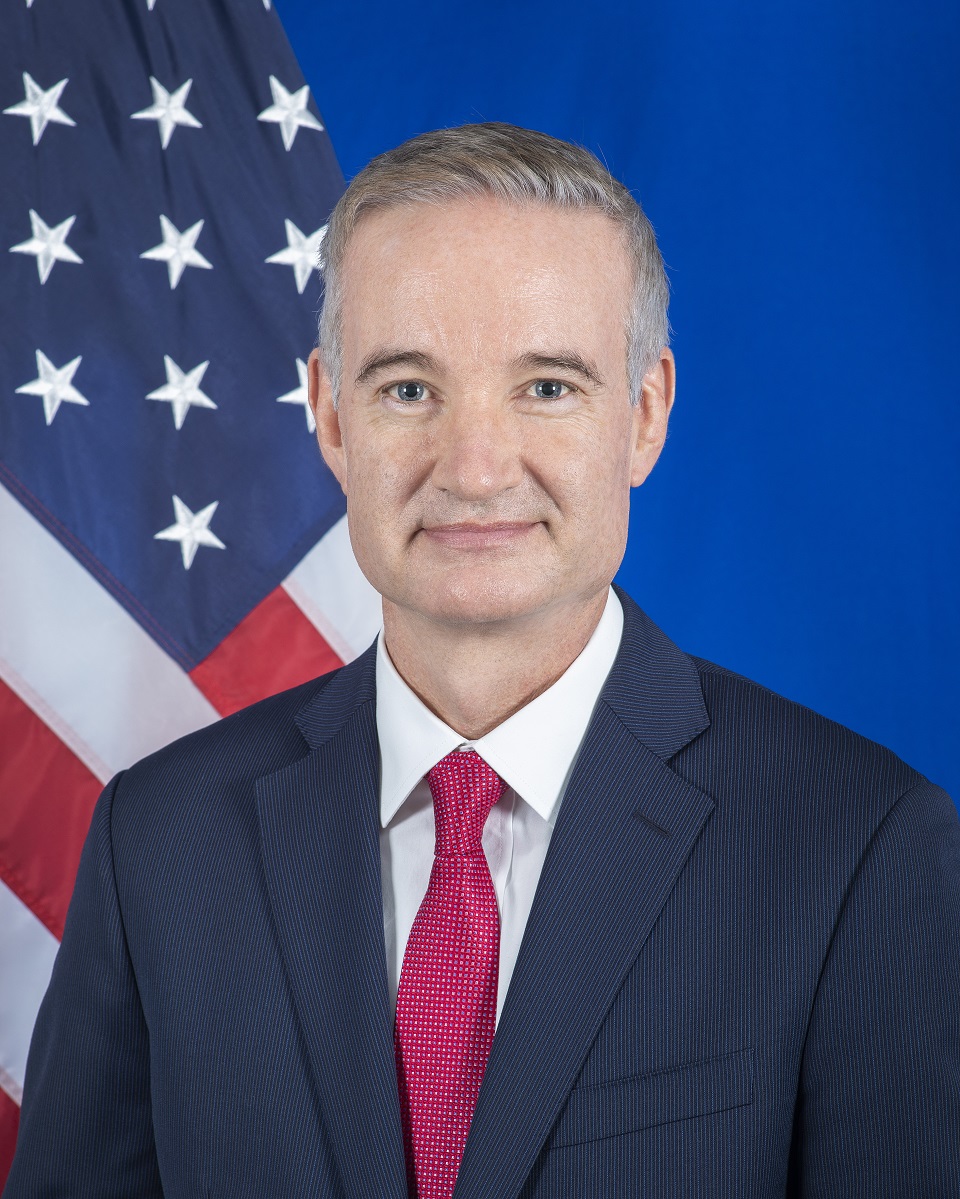 Russia has been living under sanctions since 2014. Now it seems that it is planning to invade Ukraine as a way to force Kyiv to promise that it will not join NATO. This promise might be requested in exchange for a ceasefire and the withdrawal of Russian troops back to Russia. Can NATO block this strategy only by threatening more sanctions?
Russia has been living under sanctions since 2014. Now it seems that it is planning to invade Ukraine as a way to force Kyiv to promise that it will not join NATO. This promise might be requested in exchange for a ceasefire and the withdrawal of Russian troops back to Russia. Can NATO block this strategy only by threatening more sanctions?
In terms of the consequences that would flow from a military escalation in Ukraine, I think we’re not just talking about more financial sanctions; I think we’re talking about broad-based economic sanctions across many different sectors. I think you’re looking at the possibility of additional political and diplomatic steps that would impose costs on Russia. Nothing is off the table. We’re looking at dramatic military repercussions in terms of what NATO is willing to do to change its force posture, especially on the Eastern flank of the alliance – and additional steps. We hope that we don’t go there. But if we do, this will be an all-encompassing effort to impose very severe costs of a type that we haven’t seen yet.
So what Russia wants is for Ukraine to never join NATO.
As for Russia’s stated desire that Ukraine will never join NATO, I say that first of all, we wouldn’t be upending the entire international system, which is based on the sovereign right of states to choose their alliances. The sovereign equality of nations is explicitly laid out in the Helsinki Final Act and in the Charter for European Security that was adopted in 1999, which, by the way, the Russian president at the time signed up to. This explicitly says that every sovereign state in the OSCE has a right to choose its own alliances and its own geopolitical future. There is no desire, none whatsoever to upend the international system. And so we pursue the path of diplomacy but not the path of undermining our core principles.
In case of an invasion, what could Greece be called on to contribute to the common effort?
I think a number of things. I think diplomatically we would seek to condemn the Russians and ensure they pay a diplomatic price for the military escalation in Ukraine. I think that we would look to have solidarity and unity among Western partners and allies in terms of imposing economic and financial costs. We would look how we can reinforce our deterrence posture together with our Greek friends. And, you know, Souda Bay is, no secret, one of the key strategic assets we are able to use. There are so many other things that we do. And on energy security we cooperate so closely. By the way, any crisis in Ukraine is also likely to be an energy crisis, and so we have to coordinate this as well. All of that will be on the table in the event of a crisis. Let’s hope we don’t get there.
There has been talk recently about strengthening the military status of Alexandroupoli port. Russian Foreign Minister Sergey Lavrov refered to it recently. Is this port going to be used as well?
Alexandroupoli has been a key node in the energy network in Eastern Europe, and Southeastern Europe. I don’t have anything to announce regarding Alexandroupoli, but Greece and the US are so closely knit up in so many different domains in terms of air forces, naval forces and land forces. We can talk about a very, very strong partnership. If Mr Lavrov doesn’t like it, well, that’s too bad, but we really value this partnership. It is not aimed at any other country. It is aimed at bringing us closer in our defensive alliance, which is NATO.
Is NATO united? Is Turkey on the same page as rest of NATO, despite its warm relations with Moscow?
I can tell you that Τurkey has participated actively in the discussions in Brussels. They have participated actively in the discussions here at the OSCE and they have actually spoken rather forthrightly about the consequences of Russia’s re-invasion of Ukraine. Now, obviously, at the same time there are reports in the media about the S-400 missile system and other issues. So, obviously we have concerns about some of Turkey’s recent behavior but Turkey is a NATO ally and we’re working with them very closely. I’m working very, very closely with my Turkish counterpart here in Vienna to make sure that we’re all on the same page.
You said that the possible invasion of Ukraine would transform the crisis into an energy crisis. Germany has said that it is ready to pay the price of confronting Russia. Is the US ready to help Europe cover its energy needs if Russia stops the flow of gas to Europe? Is there a contingency plan?
Those discussions are ongoing in terms of how to prepare for every possible eventuality, including reductions in the supply of oil and gas to Europe. And we’re looking at a range of measures and coordinating very closely with both supply and transit. By the way, we also need to be prepared on the humanitarian angle because re-invasion of Ukraine is also going to be a humanitarian catastrophe.
